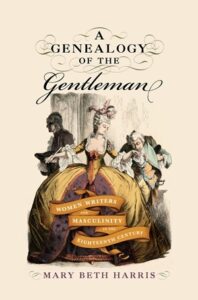
Mary Beth Harris
Hardback
March 2024 • ISBN 9781644533291 • $150.00
Paperback
March 2024 • ISBN 9781644533284 • $49.95
* E-Book Available
Order Online
Series
Early Modern Feminisms
A Genealogy of the Gentleman: Women Writers and Masculinity in the Eighteenth Century poses a direct challenge to Virginia Woolf’s claim, that “Women do not write books about men.” On the contrary, not only were women writers in the eighteenth century able and capable of writing about and for men (though of course not exclusively), but that they had a vested interest in doing so, and, perhaps most importantly, women played a crucial role in constructing and popularizing one of the most widely recognized and continuously influential modes of masculinity: the gentleman. By placing writers such as Mary Davys, Eliza Haywood, Charlotte Lennox, Elizabeth Inchbald, and Mary Robinson in dialogue with canonical representatives of the gentleman author—Joseph Addison and Richard Steele, David Hume, Samuel Johnson, and Samuel Richardson—Mary Beth Harris shows how these women carved out a space for their literary authority not by overtly opposing their male critics and society’s patriarchal structure, but by rewriting the persona of the gentleman as a figure whose very desirability and appeal were dependent on women’s influence. A Genealogy of the Gentleman argues that eighteenth-century women writers made key interventions in modern ideals of masculinity and authorship through their constructions of the gentleman in courtship novels, and that their versions of the gentleman allowed these authors to co-opt literary and moral authority.
About the Author
Mary Beth Harris is assistant professor at Emporia State University where she teaches English and serves as the Director of the Composition Program. Her book A Genealogy of the Gentleman: Women Writers and Masculinity in the Eighteenth-Century was published March 2024 by University of Delaware Press. Her other most recent work can be found in Tulsa Studies in Women’s Literature and The Eighteenth Century, as well as in two edited collections, Castration, Impotence, and Emasculation in the Long Eighteenth Century and A Spy on Eliza Haywood: Addresses to a Multifarious Writer.
